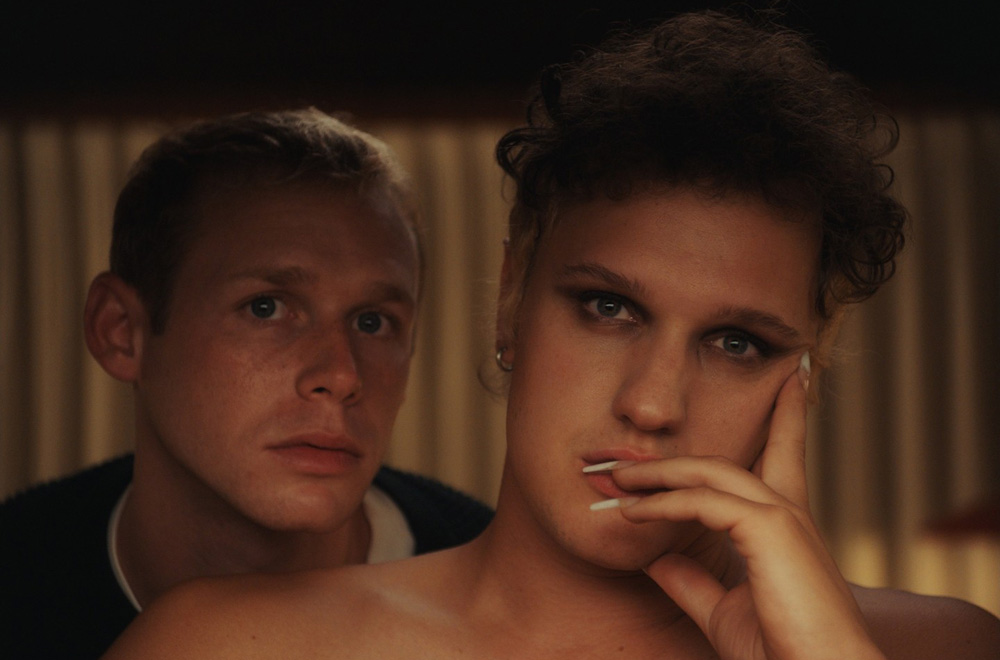Even with the countless number of times that Antonio Marziale has had to replay his directorial debut “Starfuckers” – first in his head, then acting it out on set and finally perfecting it in the edit – it still manages to surprise him, almost as much as it did for anyone who caught it recently at the Sundance Film Festival.
“What I love about the piece is I can’t always put my finger on it,” Marziale said. “Sometimes I think it’s a drama and other times I do watch it and parts of it really feel like a comedy to me. There was so much heart built into the piece, so to share it with the world and have queer films being told and created, I’m just grateful it was actualized and that people are responding well to it.”
While Marziale may not have been able to hear anyone shriek either in horror or glee during the film’s premiere at the virtual festival – or maybe he still could from all across the country, given the intensity of the reaction “Starfuckers” inspires – he nonetheless could take comfort in pulling off the unexpected, creating his first plot twist in getting behind the camera after steadily working as an actor in “Alex Strangelove” and a regular on the series “Altered Carbon” and then fashioning a pitch black comedy set in the Hollywood Hills where an overprivileged director (Jonathan Slavin) used to having all whims catered to gets more than he bargained for when an actor (Cole Doman), whose career is at his mercy, is invited over to work out his kinks and ends up turning the tables. While it’d be criminal to say exactly how the power shifts, it does involve the actor’s companion (Marziale) who shows up in drag for a fitting finale, exposing how exploitation has been dressed up again and again in different forms throughout time.
With the film’s first in-person screenings this week at Berlinale, Marziale spoke about creating something so lit under the cloak of night with “Starfuckers,” preparing for such a demanding role and being able to afford his actors with what he’d want from a director himself.
How did this come about?
I was thinking about how art can be used to process trauma and I’ve always loved watching drag and drag performers express themselves, so through the backdrop of a clear power dynamic that can often be set up in Hollywood [where] the have and have nots can be quite clear, I [thought] what if we forced someone who did something bad to kind of watch a person they victimized have all the agency, but also be witness to their pain. These issues are not solely related to stuff that happens in Hollywood, but I used that as a backdrop.
It was intriguing to hear that you actually recorded not only your own performance, but all of the characters in the film beforehand, just to get the tone right. What was that session like?
It was actually really, really fun. My original intention was not to do the voices and it’s hilarious because there’s a Marilyn Monroe impersonator website that I went to and e-mailed a couple people on there, but no one got back to me, so I was like, “Okay, maybe I should just give this a go.” [laughs] I had a lot of coffee one day and just went over to my friend’s house, Dusty, a really talented music producer and he just gave me a mic and we went through what I had written and I tried to emulate the voices of people that I’ve heard and also give it kind of my own riff on it. Any archival stuff I found online was not specific enough of the circumstances of the character, so I knew that I had to write it and I knew I was going to be lip-syncing and I really wanted it to seem like it was lip-synced, but also really coming out of this character’s mouth and having it be my voice was actually more helpful in doing that.
And when I recorded Cole’s part, he practiced it on his own [beforehand] and I knew we wanted it in one take, so I knew we’d really have to be impeccable, so I just listened to that recording over and over and over again a week before we shot so it was like second-nature. I didn’t even have to think about it and that definitely helped so that on the day we just really moved through it swiftly and we could actually pull it off in a limited amount of shots rather than cut it a lot.
How did you find your co-stars?
Cole came onboard pretty early and we talked through the story and we created his character together and Jonathan is my acting coach, but also a great actor in his own right and I knew how transformational he can be. He’s very different from the character he plays in this movie — he’s the sweetest vegan, animal-loving Echo Park resident like me, but he does such a brilliant job and Cole does such a good job code-switching between being a kind of a sweet, faux innocent school boy and then a little bit more bratty when he’s in the scene with me, so he does a really good job holding down what’s required of him in the piece.
What was it like house-hunting for this perfect location?
We actually had a house fall through last minute and I thought, “Oh God, we might have to push the shoot.” We were all so nervous and then Eli [Raskin, one of the film’s producers] found a house online and Charlotte [Taschen, the owner] let us film in her house so graciously for a fraction of the price she usually charges. It’s an absolutely beautiful house that she had a large hand in renovating while also maintaining the roots of the architecture and there was literally like a stage built into the house. We were like, “Oh my gosh, this is perfect. This is brilliant.” It’s a beautiful house, but [cinematographer] Matt Pothier really enforced that with the way he and Matthias [Peralta, the gaffer] worked together to create atmosphere with light. There were certain moments that I knew I wanted the light to interact with the face in a certain way, like in the last moment of the movie, I really wanted the whites of the eyes to be really prevalent and it’s moving so rapidly, it almost becomes abstracted in a way, which is what we were going for.
When the film breaks down into three scenes, more or less, and you shoot over three nights, could you shoot this sequentially?
We didn’t shoot sequentially, but we didn’t shoot massively out of sequence, The first two days I wanted to do pretty much all of Jonathan and Cole’s stuff together and then save the lip sync for the last day to make sure we had enough time. It was challenging to maintain energy levels throughout the night, and we shot it in July as well, so we had the minimal amount of darkness, and we really had to start at 6 pm and wrap at 6 am. We had to organize it in such a way where if there were scenes that required more dialogue, they were early during the night because when three or four starts to roll around, everyone starts to get dizzy and on the second night, we shot the dinner scene first because I knew that would require more of the actors — being an actor myself that was really nice because I was able to fight for certain things to be earlier in the night.
There is that feeling at the end of letting out your breath at the end. Did it feel the same way on set, due to the conditions of making it?
It’s funny you bring that up because when we were shooting that last rapid speech monologue, I knew that I wanted to get it in one take. It moved really fast and I never really performed it out loud before – I had listened to it over and over again, but I had never really done it full out and the first time I went through it, afterwards, I just broke down crying. And of course the scene is emotional, but I don’t think it was that but more because I was so nervous about getting it. I knew we [needed] one take where I just didn’t mess up and there was this sigh of relief of what the three days had been and how intense a film set can be. You’re trying to get everything and you’re always pressed for time, but when we nailed it, I was so relieved. It was just this really interesting moment on set where I was just letting my emotions out and everyone really held space for that. It was really vulnerable and really amazing. Then of course we did it five more times. [laughs] But it was just like, “Okay, we got it. I don’t have to worry about that.” It was great.
“Starfuckers” will screen at Berlinale as part of the “Berlinale Shorts I” Program on February 12th at noon at Cubix 6 and 6:30 pm at Cubix 9 and February 17th at CinemaxX 9 at 7 pm and February 20th at 3:30 pm at the Cineplex Titania.




